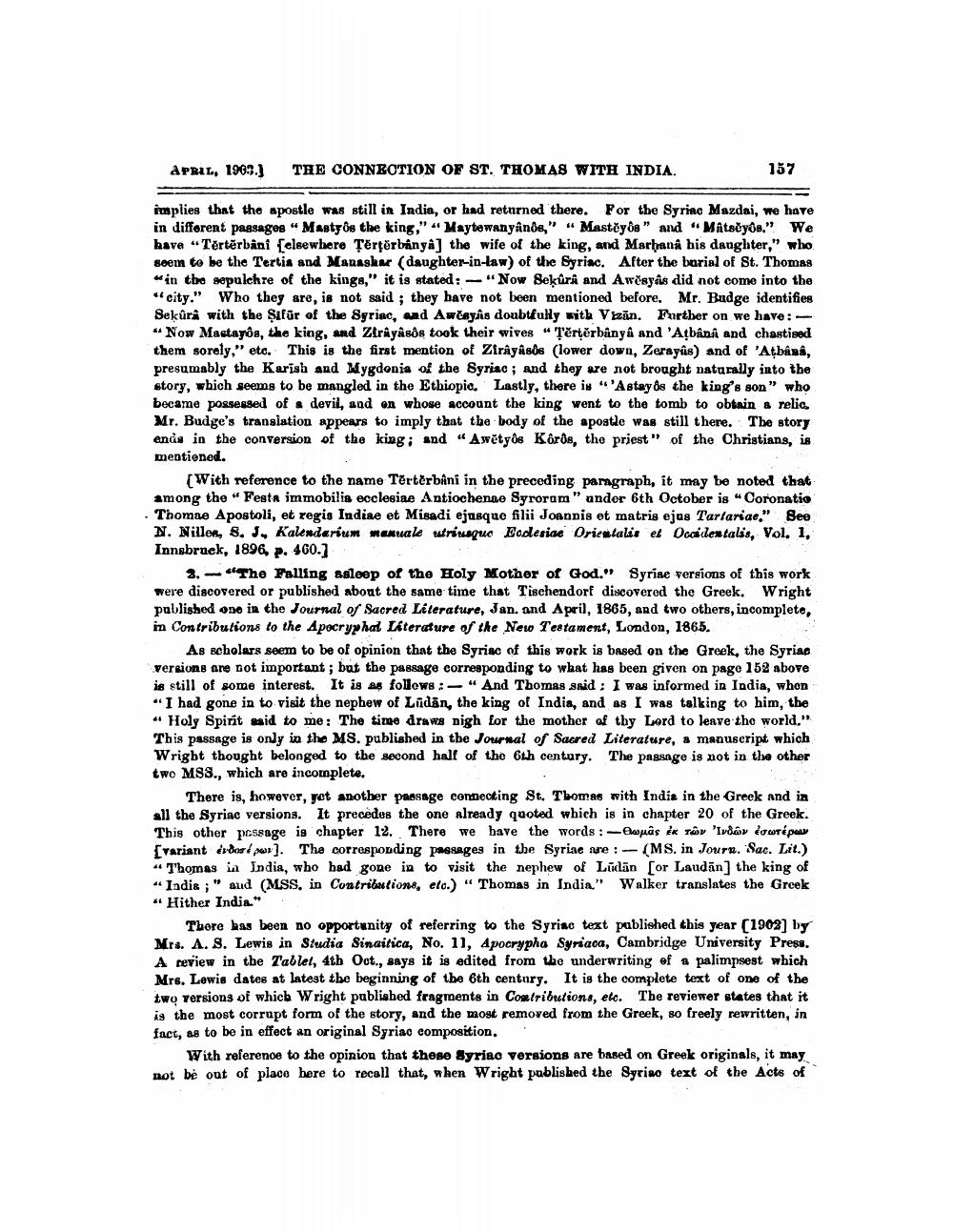________________
APRIL, 1903.)
THE CONNECTION OF ST. THOMAS WITH INDIA.
157
implies that the apostle was still in India, or had returned there. For the Syriac Mazdai, we have in difforent pagsages " Mastrôs the king," " Maytewanyans," " Mastěyos" and "Mitsčyos." We have “Tērtērbani elsewhere Tērtērbanga] the wife of the king, and Marhaná his daughter," who seem to be the Tertia and Manasher (daughter-in-law) of the Syriac. After the barial of St. Thomas Win the sepulchre of the kings," it is stated : -"Now Seķûrâ and Awcayais did not come into the "city." Who they are, is not said ; they have not been mentioned before. Mr. Budge identifies Seķürk with the şifür of the Syriac, and Awayis doubtfully with Vizan. Further on we have: - * Now Magtapos, the king, and Ztráyâbôs took their wives "Tērtěrbánya and 'Atbânî and chastised them sorely," etc. This is the first mention of Zirayasos (lower down, Zerayas) and of 'Atbaná, presumably the Karish and Mygdonia of the Syriac ; and they are not brought naturally into the story, which seems to be mangled in the Ethiopic. Lastly, there is "'Astayðs the king's son" who became possessed of devil, and on whose account the king went to the tomb to obtain a relic. Mr. Budge's translation appears to imply that the body of the apostle was still there. The story enús in the conversion of the king; and “Awētys Koros, the priest of the Christians, in mentiened.
(With reference to the name Tērtērbani in the preceding paragraph, it may be noted that among the “Festa immobilis ecclesiae Antiochenae Syrorum" under 6th October is “Coronatio Thomae Apostoli, et regis Indiae et Misadi ejusque filii Joannis et matris ejus Tartariae," See N. Niller, 8, J, Kalendarium manuale utriusque Eodesiae Orientalis et Occidentalis, Vol. 1, Innsbruek, 1896, p. 460.)
2. "The Falling asleep of the Holy Mother of God." Syriae versions of this work were discovered or published about the same time that Tischendorf discovered the Greek. Wright pablished one in the Journal of Sacred Literature, Jan. and April, 1865, and two others, incomplete, in Contributions to the Apocrypha Literature of the New Testament, London, 1865.
As scholars seem to be of opinion that the Syriac of this work is based on the Greek, the Syriap versions are not important; but the passage corresponding to what has been given on page 152 above is still of some interest. It is as follows:- “And Thomas said: I was informed in India, whon "I had gone in to visit the nephew of Lūdân, the king of India, and as I was talking to him, the " Holy Spirit said to me: The time draws nigh for the mother of thy Lord to leave the world." This passage is only in the MS. published in the Journal of Sacred Literature, a manuscript which Wright thought belonged to the second half of the 6th century. The passage is not in the other two MSS., which are incomplete.
There is, however, yot another passage connecting St. Tbomas with India in the Greek and in all the Syriac versions. It precedes the one already quoted which is in chapter 20 of the Greek. This other possage is chapter 12. There we bave the words :-Owpas dx Târ 'Ivowy dowrépou [variant erfaré per]. The corresponding passages in the Syriae ire : - (MS. in Journ. Sac. Lit.)
Thomas in India, who had gone in to visit the nephew of Lüdlän [or Laudän] the king of "Jadis ;" aud (MSS, in Contributions, etc.) “ Thomas in India" Walker translates the Greek " Hither India."
There has been no opportunity of referring to the Syriac text published this year (1902] by Mrs. A. S. Lewis in Studia Sinaitica, No. 11, Apocrypha Syriaca, Cambridge University Press. A review in the Tablet, 4th Oct., says it is edited from the underwriting of a palimpsest which Mrs. Lewis dates at latest the beginning of the 6th century. It is the complete text of one of the two versions of which Wright published fragments in Coretributions, etc. The reviewer states that it is the most corrupt form of the story, and the most removed from the Greek, so freely rewritten, in fact, as to be in effect an original Syriac composition. "
With reference to the opinion that these Syriac versions are based on Greek originals, it may not be out of place here to recall that, when Wright published the Syrimo text of the Acts of




